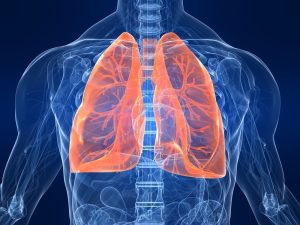
A persistent cough lasting a month or longer (that may produce mucus or phlegm) should be investigated. Chronic obstructive pulmonary disease (COPD), bronchiectasis and pulmonary fibrosis are causes.
Coughing up blood or rust-colored sputum/mucus (called haemoptysis), has several causes. All need throough investigation.
Note. This is a red flag symptom. In someone over 30 years (especially smokers) lung cancer needs to be excluded.
Shortness of breath or difficulty breathing has several causes, including pulmonary embolism (PE), pneumothorax, COPD and asthma.
A whistling or rattling sound while breathing, indicates airway obstruction, usually due to either COPD or asthma.
Pneumonia symptoms are variable. They range from mild to severe, and classically include cough (sometimes with green or yellow mucus), shortness of breath, chest pain (pleuritic, see point 5) and fever.
Some individuals have more non-specific symptoms including rigors (chills), loss of appetite, and nausea or vomiting.
In older adults or those with weakened immune systems, symptoms may be even less typical, and patienst present with confusion or collapse.
Chest pain that worsens when breathing in, moving or coughing (called ‘pleuritic’) is usually due to lung disease rather than heart.
Hoarseness or changes in voice that lasts for more than three weeks should be investigated. Causes include lung cancer, and less serious causes.
Swollen ankles can be a sign of heart failure due to long-term lung disease.
Feeling tired or weak due to lack of oxygen can occur in several long-term lung diseases.
Recurring lung infections, such as pneumonia or bronchitis, may indicate underlying lung disease – like cystic fibrosis or bronchiectasis.